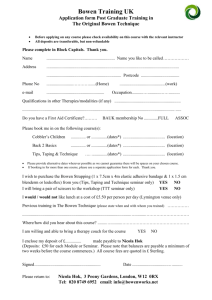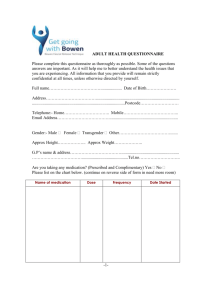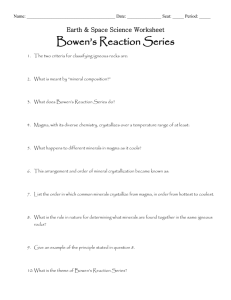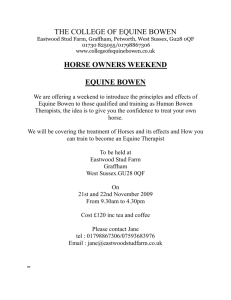12 It was Feb. 2, 1972, Groundhog Day, when Gary Bowen... rejecting me by showing them how valuable I could
advertisement
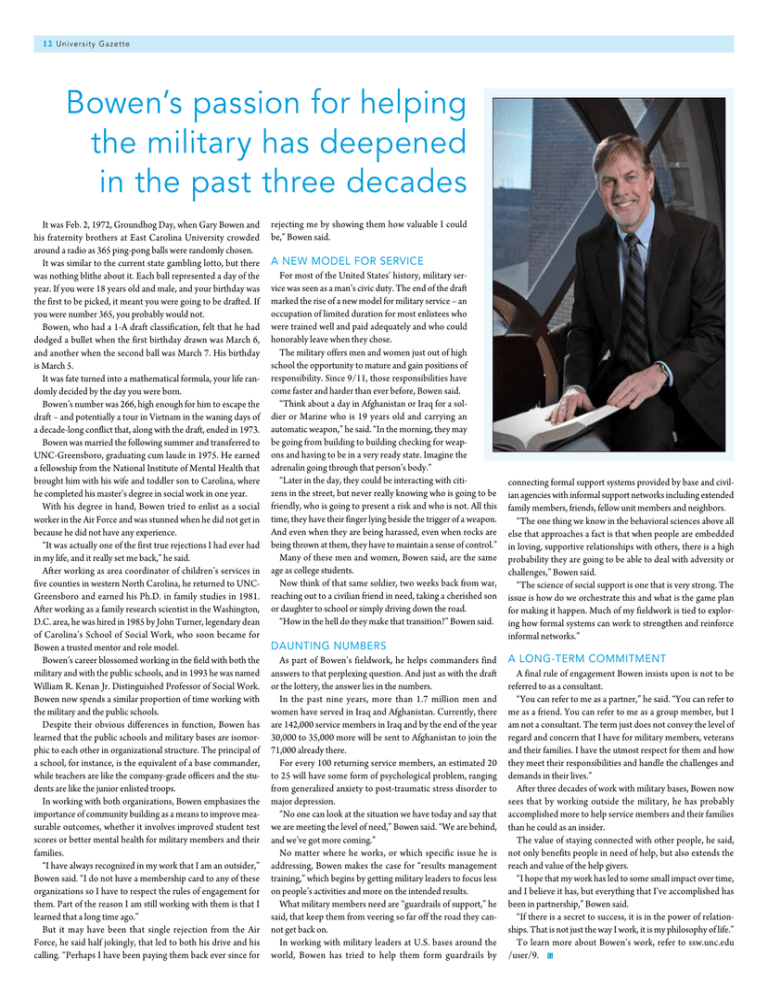
12 University Gazet t e Bowen’s passion for helping the military has deepened in the past three decades It was Feb. 2, 1972, Groundhog Day, when Gary Bowen and his fraternity brothers at East Carolina University crowded around a radio as 365 ping-pong balls were randomly chosen. It was similar to the current state gambling lotto, but there was nothing blithe about it. Each ball represented a day of the year. If you were 18 years old and male, and your birthday was the first to be picked, it meant you were going to be drafted. If you were number 365, you probably would not. Bowen, who had a 1-A draft classification, felt that he had dodged a bullet when the first birthday drawn was March 6, and another when the second ball was March 7. His birthday is March 5. It was fate turned into a mathematical formula, your life randomly decided by the day you were born. Bowen’s number was 266, high enough for him to escape the draft – and potentially a tour in Vietnam in the waning days of a decade-long conflict that, along with the draft, ended in 1973. Bowen was married the following summer and transferred to UNC-Greensboro, graduating cum laude in 1975. He earned a fellowship from the National Institute of Mental Health that brought him with his wife and toddler son to Carolina, where he completed his master’s degree in social work in one year. With his degree in hand, Bowen tried to enlist as a social worker in the Air Force and was stunned when he did not get in because he did not have any experience. “It was actually one of the first true rejections I had ever had in my life, and it really set me back,” he said. After working as area coordinator of children’s services in five counties in western North Carolina, he returned to UNCGreensboro and earned his Ph.D. in family studies in 1981. After working as a family research scientist in the Washington, D.C. area, he was hired in 1985 by John Turner, legendary dean of Carolina’s School of Social Work, who soon became for Bowen a trusted mentor and role model. Bowen’s career blossomed working in the field with both the military and with the public schools, and in 1993 he was named William R. Kenan Jr. Distinguished Professor of Social Work. Bowen now spends a similar proportion of time working with the military and the public schools. Despite their obvious differences in function, Bowen has learned that the public schools and military bases are isomorphic to each other in organizational structure. The principal of a school, for instance, is the equivalent of a base commander, while teachers are like the company-grade officers and the students are like the junior enlisted troops. In working with both organizations, Bowen emphasizes the importance of community building as a means to improve measurable outcomes, whether it involves improved student test scores or better mental health for military members and their families. “I have always recognized in my work that I am an outsider,” Bowen said. “I do not have a membership card to any of these organizations so I have to respect the rules of engagement for them. Part of the reason I am still working with them is that I learned that a long time ago.” But it may have been that single rejection from the Air Force, he said half jokingly, that led to both his drive and his calling. “Perhaps I have been paying them back ever since for rejecting me by showing them how valuable I could be,” Bowen said. A new model for service For most of the United States’ history, military service was seen as a man’s civic duty. The end of the draft marked the rise of a new model for military service – an occupation of limited duration for most enlistees who were trained well and paid adequately and who could honorably leave when they chose. The military offers men and women just out of high school the opportunity to mature and gain positions of responsibility. Since 9/11, those responsibilities have come faster and harder than ever before, Bowen said. “Think about a day in Afghanistan or Iraq for a soldier or Marine who is 19 years old and carrying an automatic weapon,” he said. “In the morning, they may be going from building to building checking for weapons and having to be in a very ready state. Imagine the adrenalin going through that person’s body.” “Later in the day, they could be interacting with citizens in the street, but never really knowing who is going to be friendly, who is going to present a risk and who is not. All this time, they have their finger lying beside the trigger of a weapon. And even when they are being harassed, even when rocks are being thrown at them, they have to maintain a sense of control.” Many of these men and women, Bowen said, are the same age as college students. Now think of that same soldier, two weeks back from war, reaching out to a civilian friend in need, taking a cherished son or daughter to school or simply driving down the road. “How in the hell do they make that transition?” Bowen said. Daunting numbers As part of Bowen’s fieldwork, he helps commanders find answers to that perplexing question. And just as with the draft or the lottery, the answer lies in the numbers. In the past nine years, more than 1.7 million men and women have served in Iraq and Afghanistan. Currently, there are 142,000 service members in Iraq and by the end of the year 30,000 to 35,000 more will be sent to Afghanistan to join the 71,000 already there. For every 100 returning service members, an estimated 20 to 25 will have some form of psychological problem, ranging from generalized anxiety to post-traumatic stress disorder to major depression. “No one can look at the situation we have today and say that we are meeting the level of need,” Bowen said. “We are behind, and we’ve got more coming.” No matter where he works, or which specific issue he is addressing, Bowen makes the case for “results management training,” which begins by getting military leaders to focus less on people’s activities and more on the intended results. What military members need are “guardrails of support,” he said, that keep them from veering so far off the road they cannot get back on. In working with military leaders at U.S. bases around the world, Bowen has tried to help them form guardrails by connecting formal support systems provided by base and civilian agencies with informal support networks including extended family members, friends, fellow unit members and neighbors. “The one thing we know in the behavioral sciences above all else that approaches a fact is that when people are embedded in loving, supportive relationships with others, there is a high probability they are going to be able to deal with adversity or challenges,” Bowen said. “The science of social support is one that is very strong. The issue is how do we orchestrate this and what is the game plan for making it happen. Much of my fieldwork is tied to exploring how formal systems can work to strengthen and reinforce informal networks.” A long-term commitment A final rule of engagement Bowen insists upon is not to be referred to as a consultant. “You can refer to me as a partner,” he said. “You can refer to me as a friend. You can refer to me as a group member, but I am not a consultant. The term just does not convey the level of regard and concern that I have for military members, veterans and their families. I have the utmost respect for them and how they meet their responsibilities and handle the challenges and demands in their lives.” After three decades of work with military bases, Bowen now sees that by working outside the military, he has probably accomplished more to help service members and their families than he could as an insider. The value of staying connected with other people, he said, not only benefits people in need of help, but also extends the reach and value of the help givers. “I hope that my work has led to some small impact over time, and I believe it has, but everything that I’ve accomplished has been in partnership,” Bowen said. “If there is a secret to success, it is in the power of relationships. That is not just the way I work, it is my philosophy of life.” To learn more about Bowen’s work, refer to ssw.unc.edu /user/9.
